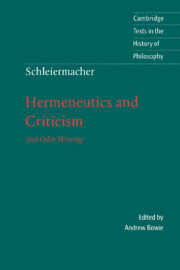Schematism and Language
Published online by Cambridge University Press: 05 June 2012
Summary
(from Friedrich Schleiermachers Dialektik, ed. R. Odebrecht, Leipzig 1942, pp. 370–81)
Knowledge rests … on two characteristics: on general identity of construction and on agreement with the being to which the thought refers. As far as the latter is concerned, we have stated: If we do not assume a general belonging together of the inner process with being, to the extent that it affects the organic function, then there is no truth in relation to being affected from outside, and we would only have sensation. For nothing becomes an object for us unless the organic impression becomes an image and is related to something particular. All truth therefore depends on our assuming:
1. The general images which form themselves in us are identical with the system of innate concepts.
2. The relation of the organic impressions to these images expresses what the fixed differences in being themselves are.
Admittedly mistakes are often made in relating the general image to a particular. (If I, e.g., see a horse as a cow.) But then precisely only if one does not possess the organic impression completely enough and does not wait for the meeting [of general image and particular]. But the general image retains its truth (the general concept ‘animal’ is always there as a true basis), even if the relation is mistaken.
- Type
- Chapter
- Information
- Schleiermacher: Hermeneutics and CriticismAnd Other Writings, pp. 269 - 280Publisher: Cambridge University PressPrint publication year: 1998



